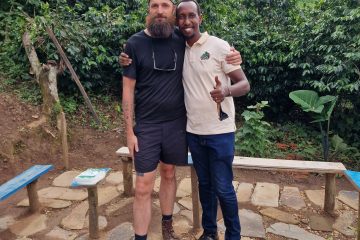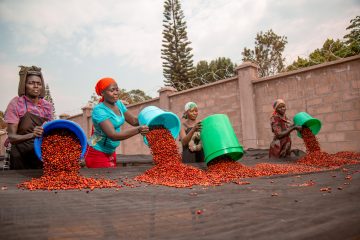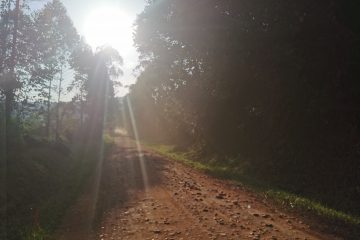Last summer I went back to Uganda, following up on a project we started in 2018. While there I visited the West Region and launched some new projects. These initiatives in Uganda have yielded some amazing coffees which are on their way to Belgium, estimated to arrive in port on March 28th.
We believe that Uganda will play a significant role in the specialty coffee industry of the future. There are great coffees here, plus it’s a country with huge potential for consistently good naturals on scale, probably the best origin outside Ethiopia.

Our sourcing in Uganda
We started our work in Uganda 2018, and we are still developing our model here. While we have different product categories and supply chain models, all our coffees are exported through Great Lakes Coffee Ltd (GLC). We pre-contract and book coffees of different preparations representing different styles and flavour profiles. We also pre-finance parts of the value chain.
We are focused on three different regions across two suppliers and supply chain models, mainly developing concepts around naturals and improved fermentation and drying protocols. We aim to offer great and consistent naturals on scale.

The East Region
We began buying coffees from Mt. Elgon in the East Region in 2018. Our coffees here are harvested November to January. The Rwnenzori mountain range has a different rainy season and an opposite harvest cycle which starts in July.
We see amazing potential here right now. All the coffees are from smallholder communities close to the Kenyan border, with farms at altitudes above 1800 masl, and a good biodiversity with several different varieties growing. We are mainly preparing naturals, with different pre-fermentation protocols in cherry before the coffees are dried. All coffees are dried at the central drying station in Sironko Coffee Yard, close to Mbale town. We are also buying limited volumes of washed coffees from small washing stations owned by local producers. They are part of the GLC value chain that manages QC, traceability and exports for the washing stations.

The Western Region
We have just added coffees from the West to our portfolio. The supplier/exporter is just starting with collection centres for cherry purchase from smallholders. Farmers have about 600 trees on average, each produces approximately 0.5 kg of greens. They work in community groups, where each community has a lead farmer with a demonstration plot where they will train 30-50 farmers in their community.
The cherries are delivered to a collection centre with an additional premium if they arrive before 17.00 so there is still enough sunlight to sort and float the cherries before purchase. Later in the evening these coffees are picked up by a truck and brought down to a central drying space, called the Kasese Drying Yard, which is owned by GLC. Kasese Drying Yard is similar to the Sironko Drying Yard, but it has a greater capacity. The coffee is evaluated there, and if it’s up to standard it will be fermented according to our specific protocols, which include barrel or bag fermentation of up to 36 hours, before the coffee is carefully dried on raised beds and hand sorted.





0 Comments